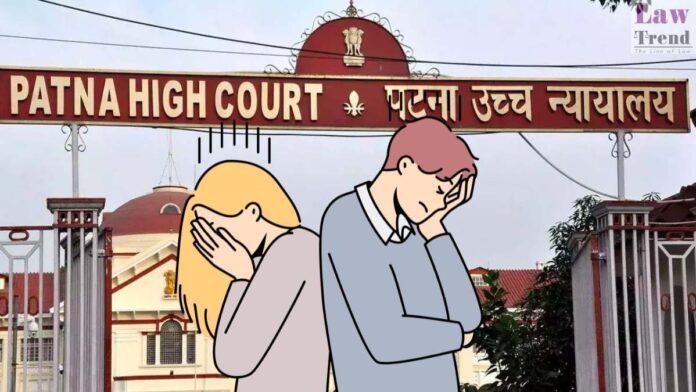The Patna High Court, in a significant ruling on matrimonial law, has set aside a Family Court’s order directing a husband to pay ₹20,000 per month as maintenance to his wife. Justice Bibek Chaudhuri held that the order was improper and illegal as the lower court failed to obtain and consider the mandatory affidavits of assets and liabilities from both parties, as laid down by the Supreme Court. The case has been remanded for a fresh decision after compliance with these procedural requirements.
The judgment was delivered in a Criminal Revision application filed by the husband, Ravi Prakash Saxena, challenging the order dated May 24, 2024, passed by the Principal Judge, Family Court, Saran at Chapra, under Section 125 of the Code of Criminal Procedure (Cr.P.C.).
Background of the Case
The petitioner-husband and the respondent-wife met through a matrimonial website and solemnized their marriage on February 16, 2020. This was the second marriage for the wife, a fact that was central to the dispute. Marital discord led to their separation, and the wife filed an application for maintenance on March 9, 2021. Subsequently, on February 18, 2022, she also lodged a police complaint against the husband under Sections 498A, 315, and 34 of the IPC, and Sections 3 and 4 of the Dowry Prohibition Act.

The Family Court, noting the husband’s declared annual income of ₹15,52,125 for the financial year 2023-24, awarded a monthly maintenance of ₹20,000 to the wife. Aggrieved by this decision, the husband moved the High Court.
Arguments of the Parties
Petitioner-Husband’s Contentions:
The husband, represented by Advocate Mr. Amit Mallick, challenged the order on several grounds. He argued that the wife was not entitled to maintenance as she was able to maintain herself. He submitted that she had received ₹40 lakhs as a one-time alimony from her first husband and was highly qualified with an M.Sc. in Botany and a diploma in Japanese, making her capable of earning a decent income.
A key argument was that the wife had committed fraud by swearing an affidavit at the time of their marriage declaring herself to be unmarried. He contended that this suppression of her previous marital status vitiated her claim for equitable relief.
Furthermore, he alleged that the wife had deserted him without sufficient cause, refused to cohabit, and had filed a delayed and fabricated dowry complaint nearly a year after filing for maintenance. He also informed the court that he was now unemployed, a situation he attributed to the wife’s complaint. Citing the Supreme Court’s decision in Rajnish v. Neha (2021), the petitioner argued that the trial court had mechanically passed the order without following the compulsory guidelines requiring disclosure affidavits of assets and liabilities.
Respondent-Wife’s Contentions:
The wife refuted all allegations. She claimed that she had given the entire sum of ₹40 lakhs received from her previous marriage to the petitioner. She alleged that the petitioner had demanded a dowry of ₹15 lakhs and subjected her to physical and mental torture, which led to an abortion and forced her to leave the matrimonial home on October 10, 2020.
Regarding the “unmarried” affidavit, her counsel argued that her status as a divorcee was clearly disclosed on the matrimonial site where the parties met. It was submitted that after a decree of divorce, the status of the dissolved marriage becomes non-est, and therefore, she did not commit any illegality by declaring herself unmarried in the affidavit.
High Court’s Analysis and Decision
After hearing both sides, Justice Bibek Chaudhuri focused on the procedural mandate for determining maintenance. The Court observed that the argument of fraud regarding the wife’s prior marriage was untenable because her divorcee status was publicly disclosed on the matrimonial site, and thus the petitioner could not claim ignorance.
However, the Court found merit in the petitioner’s argument regarding the non-compliance with the Supreme Court’s guidelines. Justice Chaudhuri noted that the trial court was under a statutory obligation to direct the parties to file affidavits of assets and liabilities.
The Court stated, “Only on due consideration of such affidavits of assets and liabilities, it will be possible for the Court to consider the status of the parties, their assets, respective needs, capability of earning and on the basis of such documents, Court can come to a conclusive decision with regard to amount of maintenance.”
The judgment extensively referenced the Supreme Court’s ruling in Rajnish v. Neha, which made the filing of such affidavits compulsory to ensure transparency and a fair determination of maintenance. The Court also cited Jasbir Kaur Sehgal v. District Judge, Dehradun, which emphasized considering the wife’s potential earnings, and Deb Narayan Halder v. Anushree Halder, which highlighted the importance of contemporaneous evidence in matrimonial disputes.
Concluding that the lower court’s order suffered from impropriety and illegality, the High Court held that it could not affirm the decision.
The Court ruled: “In view of such circumstances, this Court does not have any other alternative but to hold that the impugned order suffers from impropriety and illegality in over looking suppression of material facts, income of the parties, their source of income, their assets and liabilities and other similar factors, which are required to be considered for determination of maintenance allowance.”
Accordingly, the revisional application was allowed, and the Family Court’s order dated May 24, 2024, was quashed and set aside. The matter was sent back to the Family Court with a direction to instruct both parties to file their affidavits of assets and liabilities within four weeks. The trial judge was further directed to dispose of the maintenance proceeding by passing a fresh judgment within four weeks thereafter.







